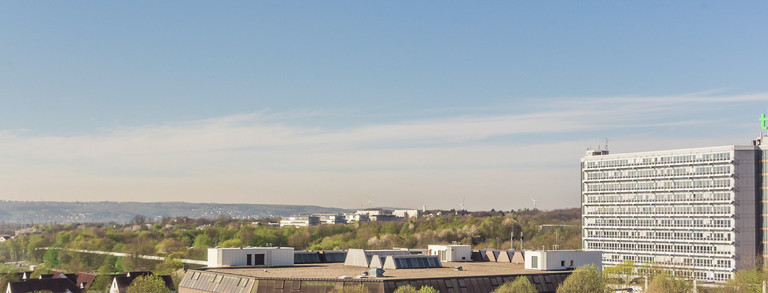The fascination of space travel: "Sowohl als Auch" about Star Trek, pulsating blue sub-dwarf stars and a quota for women in space

In her welcoming speech, Central Equal Opportunities Officer Martina Stackelbeck expressed her delight at having succeeded in attracting such interesting guests to the series of events. Prof. Metin Tolan is not only Professor of Experimental Physics and Vice-President of Finance at TU Dortmund University, he is also an award-winning scientist and is known as an original communicator of physics findings. Dr. Suzanna Randall is an astrophysicist herself and is currently being prepared for a flight to the International Space Station (ISS) through the "Die Astronautin" initiative, which aims to send the first German woman into space. As an "astronaut trainee", she is traveling around Germany to talk about her work. She wants to be a role model for girls in particular. Martina Stackelbeck reported that the Equal Opportunities Office has been following the initiative for some time: "Ever since we heard about the astronaut, it was clear to us: we definitely want to invite her."
Prof. Metin Tolan on Star Trek and the chances of discovering life in space
In his highly interesting lecture, Prof. Tolan reported on his own career and made some connections to the Star Trek series. The series awakened his passion for physics and was a constant companion in his own scientific career.
Prof. Tolan then got to the bottom of the exciting question of whether it is possible for us to discover other life in the universe at some point, as is already the case in Star Trek. He explained why it is so difficult to find planets in the first place and how it is possible to prove their existence. He also explained what conditions a planet must fulfill in order to be home to biological life - as we define it. In his conclusion, the experimental physicist formulated a positive thesis: "When I started studying, I would have thought this was impossible, but now I believe that we may be able to prove the existence of other life in the universe in my lifetime." Prof. Tolan has great respect for the pioneers who are prepared to set off into space, like the budding astronaut Randall: "I would never get on a spaceship like that."
Dr. Suzanna Randall wants above all to be a role model for girls
Dr. Suzanna Randall was fascinated by space from an early age. As a child, she discovered a picture of Phobos, the larger of the two natural satellites of the planet Mars, in the newspaper: "That was the first time I understood that there was not only something out there in space, but that you could also fly there." Today, Dr. Randall is an astrophysicist at the European Southern Observatory (ESO) and works for the ALMA telescope project in Chile. She is also dedicated to researching pulsating, blue sub-dwarf stars.
Thanks to an advertisement in SPIEGEL, she is now very close to her dream of flying into space. In 2016, Claudia Kessler founded the "Die Astronautin" initiative and used the newspaper ad to call on women to apply for a ticket to the International Space Station. The background to this is the astonishing fact that Germany has already sent eleven men into space, but not a single woman. Changing this is the declared aim of the private initiative.
In her presentation, Dr. Randall described the various phases of the application process, at the end of which she and meteorologist Insa Thiele-Eich were selected as astronaut trainees. After being selected, the two scientists went straight into their training, which consists of lots of theory, sporting challenges and parabolic flights to test gravity.
Dr. Randall also does a lot of public relations work to promote her mission and show girls that women can also fly into space. After all, she lacked a German woman in space as a role model in her youth. The astrophysicist summarized her mission in clear words: "My goal is for girls to see me and think: 'If she can do it, I can do it too!"
Lively discussion with the audience
Following the presentations, the diverse audience took part in a lively discussion with the invited guests. The many questions were of a very different nature. People were curious to find out exactly how a parabolic flight works and what weightlessness feels like. Dr. Randall explained what everyday life on the ISS can look like and that the space station is actually quite spacious.
Prof. Metin Tolan reiterated that he never wanted to become an astronaut, even though he is still fascinated by space. When asked which planet is currently the most exciting to explore, Tolan and Randall agreed: Titan is so fascinating because there is currently speculation that life could form in its lakes from liquid hydrocarbons such as methane or ethane. These substances are suitable as solvents for chemical reactions that occur in living organisms. However, astronaut trainee Randall's personal favorite is Triton, simply because she had a cat of the same name.
"Sowohl als Auch'' is a series of events organized by the Equal Opportunities Office that focuses on women's and gender studies at TU Dortmund University as well as current discourses within gender equality movements. The format addresses current social debates and brings them together with academic issues.





